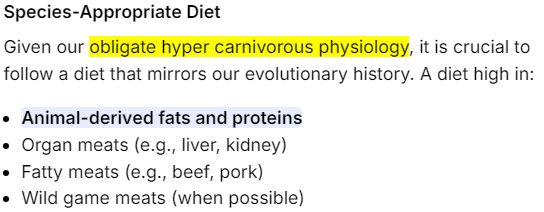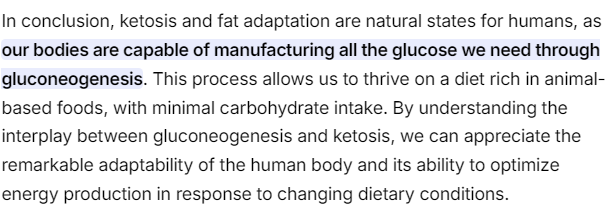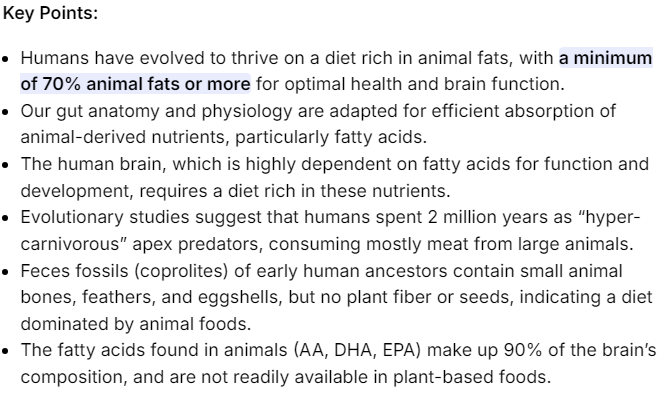Today we’ll take a look at Anabolic Minds, a quite popular bodybuilding and supplement website very similar to T-Nation, but with fewer advertisement articles and less pushing for toxic and useless supplements.
While their article on the Carnivore Diet vs. The Mediterranean Diet was a total mess of being totally clueless of bioavailability and what nutrients actually are, their latest article on insulin is a perfect example of getting some things right while being totally misled by backwards-thinking and pseudoscience because they do not understand the basics of human physiology and biology.
As for this example of insulin and fat loss, it all comes back to the failure to understand and acknowledge that humans are built for running on a fat metabolism and that we are supposed to be in ketosis most of the time and very rarely, if ever, consume toxic carbohydrates. That scenario should be the starting point when evaluating any physiological response, including insulin. However, as the modern society has been deceived into consuming these toxic and cheap carbohydrates and most people run on a glucose-metabolism, and thus are extremely unhealthy, everything is turned on its head as every single study with someone who is used to consuming carbohydrates becomes flawed and totally worthless, and they have to make up lies after lies to explain their “findings.”




Let’s see what Anabolic Minds put together for us on the subject of insulin and fat loss.
“Insulin is a vital hormone that plays a central role in the regulation of glucose metabolism and energy storage in the human body. It is commonly associated with diabetes management, but its functions extend beyond blood sugar regulation.”
Actually, since we are meant to run on a fat metabolism, while only producing the glucose we need through gluconeogenesis, insulin operates on a sliding scale. In normal conditions, when we only consume fat and protein, just enough insulin is made to make sure that the glucose we produce through gluconeogenesis is used by the correct tissues. And since we manufacture our own glucose depending on the immediate need, our body will never manufacture more than is needed, which means that blood glucose levels will never go above a certain threshold, as it is extremely toxic and damaging to all other tissues.


Insulin also aids in protein synthesis, energy production, and so on. However, if you for some reason consume carbohydrates, an unnatural amount of insulin is produced and released to speed-up glucose disposal as all carbohydrates turn into glucose, which again, is extremely toxic and damaging to all soft tissues. This is not a normal occurring response, as we are not meant to consume carbohydrates. It’s an emergency response critical for survival, or the elevated blood glucose from the carbohydrates would kill you!



This is critical to understand! When glucose levels reach a certain point, the saturation becomes too great and all soft tissues start to take damage. That is why blood glucose is so tightly regulated in a healthy human, and why we release extra insulin if we happen to consume toxic carbohydrates. It’s purely survival, an emergency stress response, and that is never healthy.


And that is why insulin has become associated with diabetes, a condition where your cells have taken so much damage from repeatedly elevated blood glucose that they no longer can store glucose as glycogen, and blood glucose remains elevated for longer periods of time, doing even more damage. It has absolutely nothing to do with insulin, or “resistance to insulin,” it’s simply accumulated damage from abusing your body, fueling it with toxic garbage.



“A key question that has been explored over the years is whether insulin inhibits fat loss and how it impacts the body’s ability to burn fat. The relationship between insulin and fat metabolism is complex and involves various physiological processes.”
Insulin is part of the emergency system when you consume carbohydrates. If you actually understand the physiology, it’s extremely logical. If you consume something that raises, in this case, blood glucose, which is extremely toxic and needs to be kept in a very narrow range, it’s hardly a surprise that all other energy-giving metabolisms are temporarily shut down in order to focus all efforts on lowering that toxic glucose. It would be madness if the body continued to use fat for fuel when it has an abundance of glucose, something that is also doing damage to tissues and organs.
So, of course, fat metabolism is shut down after you consume carbohydrates. However, that is not the “fault” of insulin, that is the fault of elevated blood glucose. Insulin is only a hormone released to increase the use, absorption and storage of that blood glucose to save your life.

Insulin and Its Role in Fat Metabolism
“Insulin is produced by the pancreas and is responsible for helping cells absorb glucose from the bloodstream, which they use for energy or store as fat. When insulin levels are elevated, the body tends to store more fat, particularly in adipose tissue, which leads to the concern that insulin might inhibit fat loss. This assumption is partially true, but the actual mechanism is multifaceted.”
Again, this is part of the survival mechanism when consuming carbohydrates. The elevated levels of blood glucose needs to be neutralized to minimize the damage it will cause. Some of it is burnt by spontaneous activity (as seen in children,) some of it is stored as muscle glycogen, and some of it is stored as body fat. Again, that is only a function of insulin in order to minimize tissue damage and to save your life.
“One of the fundamental ways insulin influences fat metabolism is by inhibiting lipolysis, the process where fats are broken down into free fatty acids to be used as energy.”
Yes, I already explained this. Your body needs to focus on lowering that toxic blood glucose by any means necessary. Turning off the usage of fat as fuel is one way to upregulate the use of glucose as fuel instead. Again, critical for survival and minimizing the damage.
How Insulin Inhibits Fat Oxidation
“When insulin levels are high, such as after consuming carbohydrates, the body prioritizes glucose oxidation over fat oxidation. This phenomenon has been shown in various studies examining metabolic pathways in both humans and animals.”
It’s not a “phenomenon.” It’s basic physiology. It’s a reaction to poisoning. Your body will always prioritize dealing with what is the current most dangerous threat to your health and life.

While glucose is an important fuel for some tissues, it’s meant to be produced by the body in precise quantities. Adding it from external sources causes acute poisoning as the concentration of glucose reaches toxic levels.
“Moreover, in a 2003 study by Goodpaster et al., it was shown that enhanced fat oxidation is associated with improved insulin sensitivity. The research demonstrated that weight loss, combined with exercise, increased the rate of fat oxidation, which contributed to better insulin sensitivity in obese individuals (Goodpaster, Katsiaras, & Kelley, 2003). Thus, while insulin might initially inhibit fat oxidation, improving insulin sensitivity through physical activity can lead to an overall enhancement in fat metabolism.”
In this sense, “improved insulin sensitivity” is simply the result of removing some of the toxic glucose load on the body for a time, giving it a chance to heal a little. That in turn will make some tissues able to store more glucose as glycogen again. It has nothing to do with “sensitivity” to any hormone.
This can be accomplished by more exercise, which uses glucose and glycogen as fuel, or by lowering your carbohydrate intake for a while, thus lowering the glucose load on all tissues.
It’s not complicated. It’s simple logic.
The Relationship Between Insulin, Fat Storage, and Obesity
“The role of insulin in fat storage and obesity is often highlighted in discussions about insulin’s inhibitory effects on fat loss. GIP (glucose-dependent insulinotropic polypeptide), which stimulates insulin secretion in response to nutrient intake, plays a significant role in fat storage. In a study published in the American Journal of Clinical Nutrition, Qi et al. (2012) explored how different genetic variants of the GIP receptor affected body weight and insulin resistance. They found that certain genotypes responded better to low-fat diets in terms of weight loss and improvements in insulin sensitivity, suggesting that dietary fat content can modify how insulin functions with regard to fat storage (Qi et al., 2012).”
And here is where the backwards-thinking kicks in, when they try to explain findings using their inverted and false model of people following a “balanced diet” with carbohydrates, totally ignoring the fact that humans are obligated hyper carnivores and only meant to consume fat and protein, as in animal-based foods and to run on a fat metabolism.



While they love to blame genetics for everything they can’t explain, the fact remains, there are no different genotypes or any of that made-up silly pseudoscience nonsense. All humans have the same blueprint.
What actually happens is what I have already described many many times — that repeated and prolonged elevated blood glucose damages the cells and as cellular damage accumulates, cells will become unable to store glucose or they would collapse and die. This stage is characterized by the shutdown of the Glucagon-Like Peptide 1 (GIP) receptor. It’s not “insulin resistance” it’s “glucose resistance,” it’s the last-stage survival mechanism for the cell.

Actually, there is even some evidence that the glucose itself damages the cells to such a degree that the receptor itself is damaged or even destroyed, making the cell totally unresponsive to insulin.

In other words, a reduced response to insulin, whether it’s from GIP receptor inhibition or not, is simply from accumulated damage done to the cells by elevated levels of blood glucose — from consuming carbohydrates regularly for long periods of time. It’s not more complicated than that.
“Insulin resistance, a condition where cells do not respond properly to insulin, is commonly seen in obesity. Insulin resistance results in higher circulating insulin levels, which further promote fat storage.”
Yes, as the cells become so damaged that they no longer can store glucose as glycogen, the only remaining option is to store the excess glucose as body fat. And that will accelerate fat storage, leading to obesity. Still, it’s not the fault of insulin, it’s the accumulated damage from consuming carbohydrates. The cells are shutting down or they would die.
Also, obese people tend to be much less active, burning even less glucose as energy.
After this they mention fatty liver which simply is the result of damage to the liver from prolonged elevated blood glucose. Again, it has nothing to do with insulin.
Insulin Sensitivity and Fat Loss
“Insulin sensitivity refers to how effectively cells respond to insulin. Improved insulin sensitivity means that lower amounts of insulin are required to process glucose, which has implications for fat loss. When insulin sensitivity improves, such as through physical activity or weight loss, the body is better able to switch between fat and carbohydrate metabolism, promoting fat oxidation.”
The cells can only respond to insulin if they are healthy and can actually store glucose as glycogen. What they call “insulin resistance” or “insulin insensitivity” is simply an increase in cells that are so damaged that they can’t store glucose or they would die. Hence, these cells no longer respond to insulin out of survival.


And weight loss does not improve this. It’s what you do to achieve “weight loss” that improves this. It’s crucial to make this distinction. When you lose weight you do it by eating less and perhaps moving more. By eating less, there will be less toxic glucose in the blood and by moving a bit more, some of the toxic glucose you still get from carbohydrates will be used as fuel. Both scenarios mean less glucose and less damage. This also means that some cells can recover and heal and once again store glucose as glycogen. Yes, it’s that simple. It really has nothing to do with insulin, it’s all about the cells and the damage you do.
And if the glucose load is lowered, more fat can be used as energy instead. Very simple, and very logical.
After this they cite some very bad studies that have no relevance at all to the topic.
Conclusion
“In summary, insulin does inhibit fat loss, but this effect is highly context-dependent. When insulin levels are elevated, the body prioritizes glucose metabolism and inhibits lipolysis, thereby reducing fat oxidation.”
This is backwards-thinking 101. It’s not the insulin that causes the body to prioritize glucose metabolism, you dimwits! Insulin is released as an emergency response to your blood being flooded by glucose from consuming a highly retarded meal with a load of carbohydrates! So, by the simple laws of logic, it is the consumption of carbohydrates that forces the body into a glucose metabolism, releasing insulin, and it is the high levels of blood glucose that inhibits lipolysis, as in fat oxidation — as that glucose needs to be eliminated as quickly as possible to limit the damage to your organs and soft tissues.
Insulin is simply a hormone that is released to aid in this elimination by enabling cells to store glucose as glycogen.
“Insulin is not inherently a “fat-storing” hormone; rather, its effects depend on the overall metabolic state and lifestyle factors. A better understanding of how insulin affects fat metabolism can lead to more personalized approaches to weight management and metabolic health.”
Again, stop focusing on the natural effects of the body, as in the release of insulin and start focusing on what you actually did to your body to elicit this response — as in poisoning it with carbohydrates and flooding your blood with toxic glucose. Your body is never wrong. It does everything out of survival, to make sure you live for as long as possible and reproduce. Insulin is only a part of that survival response and focusing on it has absolutely nothing to do with any of the problems caused.
We see these misconceptions and retarded thinking in all areas of modern science and medicine, and mostly because of the inverted and backwards-thinking science they are taught and conditioned not to question. Luckily, while many of us were taught the same bollocks, we managed to break ourselves free from the indoctrination and returned to the basics and logic of physiology and biology, and we will continue to educate and plant seeds. And hopefully, one day, all these lies, deceit and programming will be exposed and people can actually start to become healthy again by following our species specific diet and live our lives according to our physiology.
And here’s a simple and free tip. If you do not like how your body responds, change the input.
If you need help with any kind of health problems or transitioning from your current way of eating to our natural species-appropriate, species-specific way of eating, I’m available for both coaching and consultation.
Coaching and Consultation
And if you found the article and my insights helpful and enjoy my daily free information, please consider donating to help pay the webhosting bills and keep the site running. And if you’re interested in discussing and sharing information with likeminded people, consider joining our uncensored community at Ungovernable.se. Thank you!

